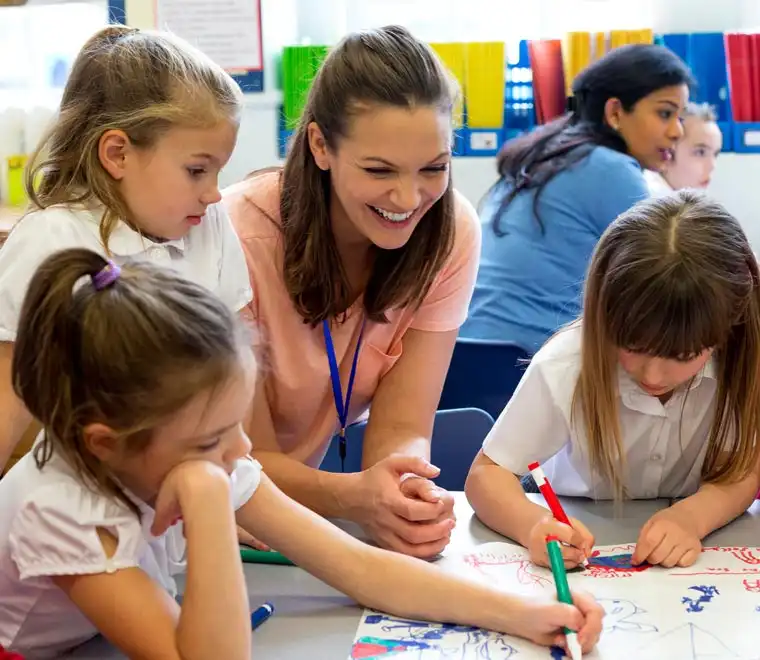There are so many great reasons to become a teacher – it’s a highly rewarding career that provides an immense sense of fulfilment. Primary school teachers, in particular, have the unique satisfaction of helping children acquire foundational knowledge and develop important new skills.
If you’re interested in becoming a professional educator, here we’ll go into detail about why primary teachers tend to have high levels of job satisfaction. Discover the top five benefits of a teaching career to decide whether it’s you who inspires our next generation.
1. Every day is different
Why become a primary teacher? In this job, no two days are the same. This keeps you perpetually engaged, making teaching the perfect career for those who love variety.
Primary teachers are required to cover a number of different subject areas including English, maths, science, geography and creative arts, which keeps the job interesting and engaging. A career as a secondary teacher, on the other hand, is best suited to those who want to specialise in one subject area.
Young children can also be very spontaneous and fun, each with their own personality and a unique way of seeing the world. Kids have a remarkable ability to come up with inventive questions and responses to new information, which can be both charming and fascinating.
Another reason why you should become a teacher is that it offers opportunities for continuous professional development. For instance, Swinburne offers professional learning workshops for teachers that aim to empower participants and enhance their teaching skills.
2. A truly rewarding experience
Among the many good reasons to become a teacher is the deep sense of gratification it can bring. No doubt you will have memories of your favourite school teachers; the positive impact they can leave on our lives is immeasurable.
Perhaps you had a first-grade teacher who praised your writing – giving you the confidence to eventually forge a successful career as a journalist. Or it could be that you had a PE teacher who saw your athletic potential and gave you a lifelong passion for fitness. There are many stories of celebrities who claim they wouldn’t be the person they are today if not for being inspired by a former teacher.
Primary teachers act as role models to young children, providing guidance, structure and inspiration. A great reason why you should become a teacher is a genuine desire to make a difference and to help future generations succeed and thrive.
3. Great career opportunities and progression
One of the pros of being a teacher is that there are so many opportunities for you to develop professionally. Not only is teaching a profession that facilitates ongoing learning, it also offers clear pathways for career progression.
If you have your sights set on a leadership role within a primary school, a Master of Teaching (Primary) can help to get you there. A master’s degree will give you the edge if your ambition is to become head of year or even the headteacher, providing you with specialist knowledge about learning technologies and the future of education.
A teaching career also offers flexibility for those who want to start a family or are already juggling the responsibilities of work and family life. Of course, there’s also the well-known perk of the job which is the holidays – giving you that generous period over the summer to travel, study and focus on hobbies. Holidays are not the only reason why teachers become teachers, but having said that, it’s certainly not a drawback either.

4. The education sector is booming
One of the key benefits of working in the education sector is that global demand for skilled teachers is on the rise. Teaching gives you several transferable skills, plus it offers mobility for those interested in teaching abroad.
With today’s increasingly mobile population, there’s increased demand for experienced teachers to work in international schools outside Australia. If you love travel and you’re wondering why work in education, this is an enticing drawcard.
There are also many opportunities for career progression beyond the field of education, for those who have reached a stage in their professional life where they want to embrace new challenges. Common career paths for people who want to broaden their horizons beyond teaching include instructional design, training and development, curriculum writing, social work, counselling, writing and publishing.
5. Be a part of a community
Why choose primary teaching, specifically? Being part of a close-knit community is one of the main reasons why people are drawn to this profession. Primary schools tend to be smaller than high schools, and the bonds that are forged between teachers, children and parents are enriching and meaningful.
Your fellow educators will also share your passion for teaching, and you’ll get to work within a supportive environment where you can learn from each other and share stories. Of the many good reasons to become a teacher, the opportunity to be a part of a flourishing community stands out. For many primary teachers, their profession isn’t simply a job, it’s a lifelong passion and vocation.
Feel free to get in touch with our friendly team to ask questions. We’re here to help you choose the right course to get you closer to your career goals.
Learn more about our Master of Teaching (Primary) and apply today to secure your place.
